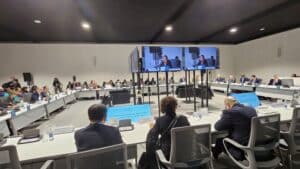MEMBER PRESS RELEASE - Landia digester mixing system ready for Australia New 4000m3 digesters in…
COP29 Declaration is a gamechanger for the biogas industry
COP29 Declaration is a gamechanger for the biogas industry
The UK among 30 signatories to a Pledge to set concrete methane emissions reduction targets from organic waste at COP29 in Baku
 On 19 November, the UK joined 29 countries signing the COP29 Declaration on Reducing Methane from Organic Waste, requiring that national climate policies set concrete targets to reduce methane from waste and food systems, aligning with the 1.5°C goal. This pledge could prove a gamechanger for the sector growth and development.
On 19 November, the UK joined 29 countries signing the COP29 Declaration on Reducing Methane from Organic Waste, requiring that national climate policies set concrete targets to reduce methane from waste and food systems, aligning with the 1.5°C goal. This pledge could prove a gamechanger for the sector growth and development.
This is a defining moment for the biogas industry, with the treatment of food and organic waste for the first time being at the heart of a formal COP declaration.
Attending the launch of the declaration at the High Level Event on Reducing Methane from Organic Waste at COP29 in Baku, Charlotte Morton OBE, Chief Executive of the UK Anaerobic Digestion and Bioresources Association (ADBA), said:
“It is great to see the UK joining the international drive to reduce methane emissions from organic waste – this represents a pivotal moment for our industry in Britain and globally. We humans generate over 105bn tonnes of these wastes every year – our own sewage, food waste, food and drink processing wastes, animal manures and slurries, other agricultural wastes.
The vast majority is not treated today. This means that they are polluting our rivers and oceans, causing air pollution, and in the context of today’s declaration, emitting methane. Simply collecting and recycling these organic wastes would deliver half of the global methane pledge, to which the UK has also committed. We are very encouraged by Britain’s commitment to addressing the issue.”
At the meeting, the UK declared its commitment to the elimination of organic wastes going to landfill by 2028 and to transitioning to a circular economy, with the Department for Food and Rural Affairs convening a group of ministers to galvanise action across the UK Government and kick start economic growth. The UK pledged to continue being a leading actor in this important endeavour to reduce methane emissions and tackle climate change.
Methane contributes to half a degree of current warming and has 80 times the warming effect of CO2 over 20 years. According to the Global Methane Pledge, launched at COP26, to keep the 1.5°C limit within reach, methane emissions must drop by 30–60% by 2030 alongside CO2 reductions.
After agriculture (40%) and fossil fuels (35%), waste (20%) from food and other organic materials left in landfills, open dumps, and wastewater, is the third largest source of methane emissions worldwide.
In addition to an improved waste management system, the COP Presidency Declaration also highlights the need to include a circular economy approach and consider zero waste practices.
At the event, Rick Duke, US Deputy Special Envoy on Climate, remarked on the efforts of the COP28 Presidency (United Arabe Emirates) to cut methane emissions from the energy sector, and now of the COP29 Presidency (Azerbaijan) to cut methane from waste – and hoped to see the same leadership from Brazil for COP30 next year, with a similar declaration that would cover agriculture.
-ENDS-
For further information, contact:
Jocelyne Bia, Head of Corporate Communications, PR and Brand Management, ADBA
e: jocelyne.Bia@adbioresources.org
t: +44 (0)203 3176 0592
Notes to editors:
- The Anaerobic Digestion and Bioresources Association (ADBA) is the trade association for the UK anaerobic digestion (AD) and biogas industry. ADBA’s vision is to see the full potential of the UK AD industry realised so it can help the UK achieve its emissions targets and other policy goals, creating a truly circular economy. www.adbioresources.org
- Anaerobic Digestion (AD) is a ready-to-use technology which transforms organic wastes such as food and agricultural waste, sewage, manure, and slurries into biogas/biomethane, a biofertiliser called digestate, bio-CO2 and other valuable bioresources for application in the energy, agriculture, and transport sectors. How AD works.
